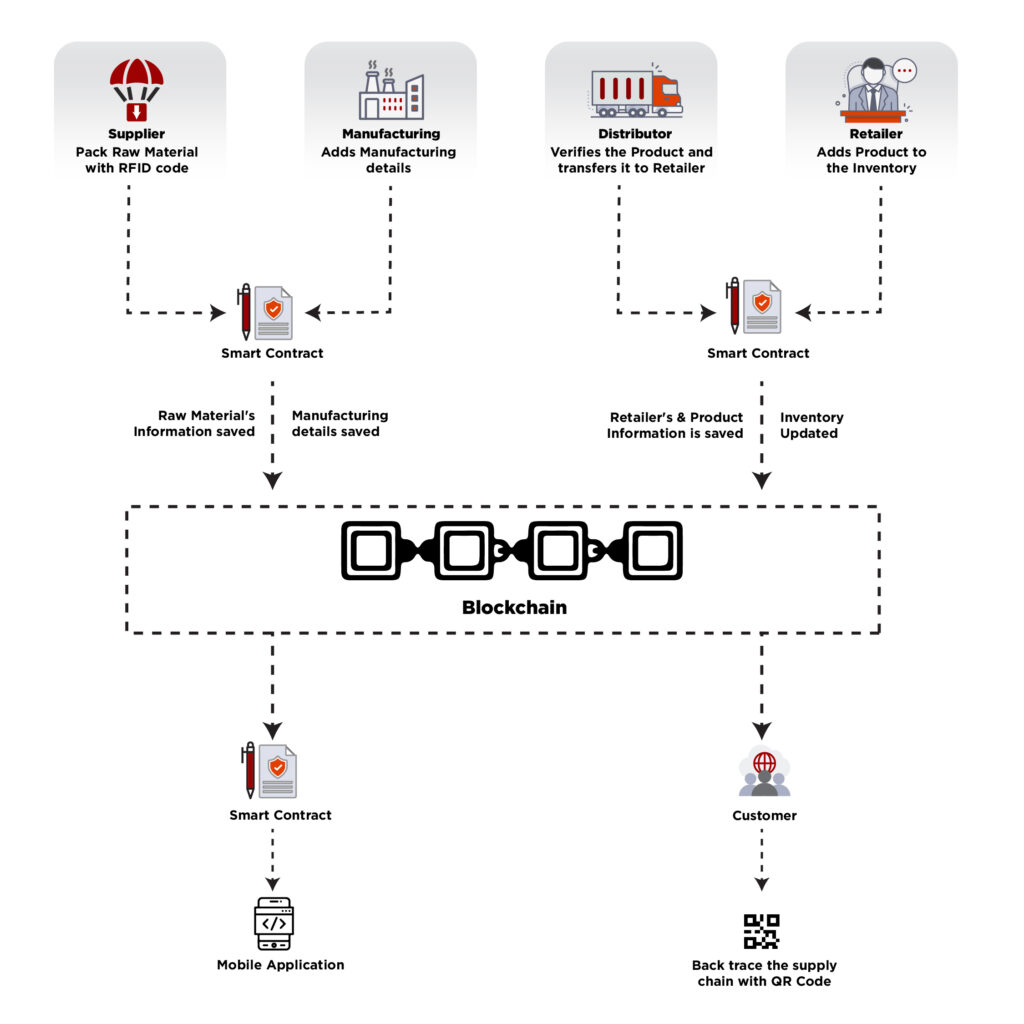What Is Blockchain in Supply Chain Management?

In today’s global world, maintaining a supply chain can be a difficult challenge. From the procurement of raw materials to the delivery of final goods, there are various points at which data can be lost or changed, resulting in inefficiencies, delays, and increased costs.
Many organizations are looking to “Blockchain Technology” to address these concerns. Blockchain technology allows for safe and transparent recording, tracking, and verification of transactions and data along the supply chain, guaranteeing that every participant has access to accurate and real-time information.
However, the use of blockchain in supply chain management is advantageous since it quickly addresses all of the components for process simplicity and cost reduction in activities.
The difficulty, however, is that, while business models and expectations have evolved, concerns of transparency and origin tracking continue to dominate the sector. Fortunately, blockchain in the supply chain appears to be a solution that can enhance the existing supply chain ecosystem’s poor status.
Let’s find out in this blog, where we’ll first detail the present supply chain environment before moving on to how Blockchain can assist.
What is Supply Chain Management?
Supply Chain Management (SCM) is a method of controlling the movement of products, resources, services, and information from raw materials to a fully functional final product supplied to the client.
The supply chain process consists of seven key components: planning, information, source, inventory, production, location, transportation, and return of goods, which together constitute the foundation of every organization. It genuinely fuels the current and future of any organization and, as a result, has a lot of clout in the world of business.
However, as security risks develop and customer expectations change, conventional supply chains face new obstacles in providing a highly efficient and trustworthy ecosystem to everybody. Several of which will be discussed in the following portion of the blog.
What Are The Challenges In Supply Chain Management?
- No Universal Database
Despite the fact that our world has become more linked, some organizations continue to keep their databases to themselves. All of the teams are keeping their own records and only sharing them with one another on request. As a result, multiple communication gaps exist between any two parties, which helps the exploiters.
- Inadequate asset tracking
The inability to track assets is another issue encountered in supply chain management. They have adopted the best equipment and techniques for monitoring internal activities, but no mechanism for tracking the condition of items once they have been shipped. This makes it easy for exploiters to substitute ‘lookalike’ counterfeit products for the authentic.
- Protracted quality evaluation procedure
Because of the discontinuity in the present SCM process, determining whether the quality has been compromised or the product has been replaced is a time-consuming and costly effort. Furthermore, due to the centralized structure, the company’s procedures are often vulnerable to numerous hazards such as code of conduct breaches and frauds.
- Inability to meet the requirements of customers
Last but not least, entrepreneurs are finding it difficult to keep up with changing consumer needs and incorporate necessary modifications into their working strategies while using the present supply chain management procedure.
Because of such supply chain challenges and increased rivalry, most, if not all, businesses have begun to express interest in the idea of implementing Blockchain.
Impact of Blockchain in Supply Chain Management?
A blockchain enabled supply chain is an innovative approach to a wide range of issues. Various processes are involved in a typical supply chain, such as raw material acquisition, production, finance, and so on. These steps can occur in one or multiple transactions.
These one or more transactions are recorded on various blocks in a blockchain supply chain. These records are subsequently spread across the blockchain’s network of computer systems, making the information incredibly accessible and transparent.
Every transaction in the supply chain is recorded on the blockchain and reflected in real time, making every stakeholder an active participant in all transactions.
Now that we understand what blockchain in the supply chain entails, let us concentrate our focus on the impact of blockchain in the supply chain by going over a list of advantages.
Reasons for Using Blockchain in Supply Chain
Several major issues have plagued supply chain management, including security concerns, a lack of transparency, traceability challenges, inefficiencies, and the need for automation. Fortunately, blockchain technology has solutions for all of these problems.
- Security
Blockchain technology increases security by providing an immutable, encrypted record of transactions that cannot be modified or interfered with, and by distributing data across a network of computers rather than a single server, it makes it hard for hackers to view or steal data. Personal data can be anonymized and permissions can be specified to prevent unauthorized access.
- Transparency
Traditional supply chain management requires each organization to have its own database, resulting in a lack of transparency. Using blockchain, transactions and data are recorded identically in multiple places, ensuring full transparency for all network users with permitted access. Transactions are time and date stamped, providing a comprehensive record of the history of the transaction.
- Traceability
Blockchain creates an audit trail at each stage of an asset’s journey by recording its origin and history. This gives consumers proof of environmental or human rights problems related with a product and exposes faults in any supply chain where things can be lying on a loading dock awaiting transit. Furthermore, blockchain allows for the direct exchange of provenance data with clients.
- Efficiency and quickness
Supply chain management can be time-consuming and inefficient, requiring third-party mediation and paperwork. Blockchain streamlines these activities, allowing for faster and more efficient transactions. Documentation and transaction data can be recorded on the blockchain, eliminating the need for paper exchanges and multiple ledger reconciliation. As a result, clearing and settling times are decreased.
- Automation
The application of smart contracts in blockchain technology allows for the automation of transactions. When pre-specified prerequisites are met, the next stage of the transaction or process is automatically initiated.
Key Areas of Blockchain Technology in Your Supply Chain
The management of the movement of products and services from point of origin to point of consumption is referred to as supply chain management. Blockchain technology can help supply chain managers by enabling transparency, traceability, speed, and consensus.
- Purchasing
Purchasing is an essential component of supply chain management since it involves the acquisition of raw materials, equipment, and services required for manufacturing.
The use of blockchain technology in purchasing helps to automate the procurement process and eliminates the need for middlemen. It can also be used to build a decentralized platform where suppliers and buyers can trade directly with one another, lowering transaction costs and increasing efficiency.
- Manufacturing
Manufacturing is the transformation of raw materials into finished goods. Blockchain technology can be used to optimize the production process by providing a secure and transparent record-keeping system. They also help to ensure product legality and quality, which is important in industries like pharmaceuticals and luxury products.
- Inventory Control
The practice of regulating and controlling the movement of products and resources throughout a supply chain is known as inventory management. Blockchain technology can be utilized to construct an inventory management system that is transparent and secure, allowing for real-time tracking of items and resources. It allows businesses to assure the quality and safety of their products, gaining customer trust.
- Demand Forecasting
The practice of anticipating and preparing for the demand for products and services is known as demand planning. Blockchain technology can be used to build a decentralized demand planning platform that enables real-time data exchange and cooperation between suppliers and customers.
- Warehousing
The practice of storing and managing commodities and resources within a supply chain is known as warehousing. Blockchain technology can be utilized to build a safe and transparent warehousing system that enables real-time tracking of products and supplies.
- Transportation
The process of transferring goods and commodities throughout a supply chain is known as transportation. Blockchain technology can be utilized to build a safe and transparent transportation system that enables real-time tracking of products and commodities in transit, and assist to lessen the danger of products being lost, stolen, or damaged during shipment.
- Customer Support
Customer service is an important aspect of supply chain management because it entails providing support and assistance to customers throughout the supply chain. It can be used to improve customer service by providing a secure and transparent record-keeping system that allows stakeholders to track and resolve customer issues quickly.
Last Thought
Blockchain technology has an influence on many domains, including supply chain management. However, to effectively incorporate the technology into your supply chain management, where blockchain can revolutionize supply chain management by delivering transparency, security, and efficiency. It is now time for businesses to embrace this powerful technology and alter the way they do business.
Ready for a supply chain upgrade?
Blockchain is the key! KaarTech offers transparency, security, and efficiency. Have queries or need guidance? Contact us anytime!
FAQ’s
What is supply chain management, and why is it so important?
Supply chain management is a multi-functional strategy that encompasses managing everything from raw material flow to internal processing and ultimate product delivery to customers. It is very important in the market since it lowers operational time and costs, improves financial standards, improves customer service, and so on.
How does Blockchain fit into the Supply Chain?
The role of blockchain in supply chain can include: real-time tracking of goods, ease of payment, reduction in time and cost involved with gathering and sharing of information, etc.
What is the best Blockchain tool for Supply Chain?
With numerous blockchain-based platforms and solutions available in the business, the best for each blockchain supply chain management organization will differ depending on the use case. As a result, it is advisable to consult with your blockchain development business before making a decision.


